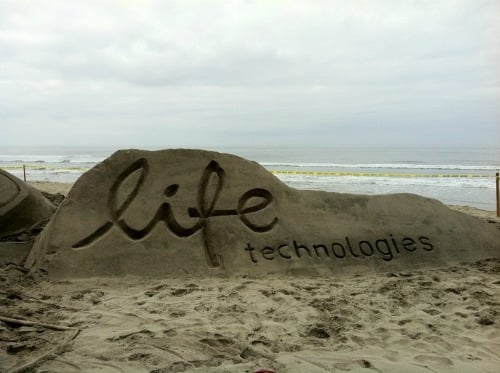Research by the University of Utah and Omica, Inc. reveal a new computational biology software tool that could dramatically change the way genetic diseases are detected. Published in Genome Research, the Variant Annotation, Analysis and Selection Tool (VAAST) can identify disease causing mutations in individual human genomes.
Tags: cancer research, Southwest, south west, Univ of Utah
Tags: genome research, Southwest, California, San Diego, Event, Laboratory Equipment Supplier, south west
A Utah State University researcher has genetically modified goats to produce spider silk. Or he almost has. The goats carry two proteins that allow spiders to weave their silk. The proteins, injected into embryos, come out in the goats' milk.
Tags: Utah, Utah State University, Southwest, animal science
 Now, rather sooner than one might have wished, that vision of a less-car-dependent populace is being put to the test. It's being called Carmageddon, the closure of the 405 Fwy through the heart of LA for an entire weekend this July 15th (at midnight) through the 17th. What will this human science experiment in the living laboratory tell us about Angelenos' prognosis for survival in a more sustainable world?
Now, rather sooner than one might have wished, that vision of a less-car-dependent populace is being put to the test. It's being called Carmageddon, the closure of the 405 Fwy through the heart of LA for an entire weekend this July 15th (at midnight) through the 17th. What will this human science experiment in the living laboratory tell us about Angelenos' prognosis for survival in a more sustainable world?According to a UCLA Newsroom report entitled "The Day the 405 Stood Still":
 At UCLA, shutting down is not an option: With a major hospital to run, summer camps to attend and petri-dish experiments to keep alive, university officials expect 8,000 to 10,000 people on campus.
At UCLA, shutting down is not an option: With a major hospital to run, summer camps to attend and petri-dish experiments to keep alive, university officials expect 8,000 to 10,000 people on campus.UCLA Today in its "UCLA braces for Carmageddon" piece adds:
More than 1,900 hospital employees will keep UCLA’s two hospitals purring, with several hundred doctors, nurses and other staff bunking in campus residence halls in case of an emergency. Roughly 200 children will attend long-ago promised sports camps, about 200 MBA students start classes, and 150 teachers from China will arrive at LAX to begin teacher-training on campus.
UCLA Medical Center's response to the potential nightmare is to put itself on high alert, take measures to see that it continues to function normally, and make on-campus housing available for commuting staff "in case of an emergency." Presumably that emergency would be impassable roads. They don't seem to anticipate an influx of patients as a result of the freeway closure, though the way the event is being imagined in science fiction terms makes it sound like casualties are inevitable. Will road rage turn into rioting and looting? Will there be a mass psychiatric meltdown? Will people trip on the unfamiliar laces of their walking shoes? Rest assured, more police will be out (on bicycles?), according to UCLA Today's article:
The UCPD and UCLA Transportation are among the departments scheduling extra staff to make sure everything runs smoothly, and both UCPD and the LAPD are considering overnighting in UCLA dorms.
Tags: University of California Los Angeles, Southwest, California, Los Angeles, Sustainable Architecture, UCLA, Event, laboratory
Since the approval of the President's Universal Heathcare Measure, researchers at the Agency for Healthcare Research and Quality (US Dept. of Health) have been tasked not only with the challenge of clarifying the options of the proposed socialized medicine program, but with marketing health itself. If healthcare is going to be funded from the public coffer, it follows that the public has a certain responsibility not to abuse that privilege with unhealthy behaviors. Put another way, good health is the right thing to do. But how do you convince people of that? A business and healthcare administration professor at the University of Utah Eccles School of Business, Debra Scammon, concludes in a recent paper in the Journal of Public Policy & Marketing titled "Transforming Consumer Health" that the answer is a strong social marketing campaign.
Tags: Utah, university of utah, Translational Research, Southwest
 In a demonstration of just how complicated it can be to do life science research, Scripps Institute of Oceanography at UCSD just announced a major project to catalog and make available to study fish that were caught by scientists 40 or 50 years ago. It's called the Library of Fishes, and thanks to an NSF award it will soon get to the stage where it can open its doors (and jars) to researchers.
In a demonstration of just how complicated it can be to do life science research, Scripps Institute of Oceanography at UCSD just announced a major project to catalog and make available to study fish that were caught by scientists 40 or 50 years ago. It's called the Library of Fishes, and thanks to an NSF award it will soon get to the stage where it can open its doors (and jars) to researchers.
Tags: Southwest, California, biomarine research, Scripps, San Diego, UCSD research, Research equipment, NSF
University of Texas' Health Science Center has received more funding from the San Antonio city council to help complete a $150 million building, scheduled to open October 13.
Tags: Southwest, UT Health Science Center San Antonio, 2011 Research Funding
The University of Arizona has received a new $2.95 million competitively-awarded, NSF grant for a comprehensive study of the effect of monsoon weather patterns on the ecology of the Southwest. The study will integrate several diverse areas of study to give a comprehensive picture of the regions unique monsoon ecology. The grant was one of only two grants considered "outstanding" by the NSF during the application process.
Tags: University of Arizona, Southwest, Arizona, Research Funding
A team of researchers at the University of Texas Health Science Center San Antonio have recently discovered a possible explanation for the high rate of pneumonia in the elderly. Community-acquired pneumonia is the leading cause of death among the elderly and this new UT research may have revealed a possible treatment.
Tags: biomedical research, University of Texas Austin, Texas, Southwest
The University of Nevada, Reno recently unveiled the new MacLean Astronomy Building and Observatory Complex. The new buildings were largely made possible by new funding from the Jack Van Sickle Foundation which gave generously to UNR in 2010.
Tags: University of Nevada Reno, UNR, Nevada, Southwest, new construction


